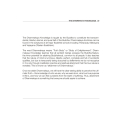self-sustaining happiness : ค้นหาหนังสือธรรมะ หน้า 16 / 45
หน้าหนังสือทั้งหมด

198
Understanding Your Mind for Serenity
If you do not know your own mind, how will serenity arise?
The responsibilities of daily life are constantly pulling your mind to attach with external forces to you because you are fixated on your ex
The text discusses the importance of self-awareness and understanding one's mind as essential steps toward achieving serenity. It highlights how external factors like daily responsibilities and politi

9
Dhamma for Laypersons: The Vital Heart of a Stable Family
The following is the extracted text from the image:
---
The following subject matter is very important for all families; whoever wants to get married, whoever wants to have children, whoever wants t
Understanding family dynamics is essential for those looking to marry or raise children. This text emphasizes the importance of Dhamma for Laypersons, outlining four critical elements: truthfulness, s

11
The Dynamics of Family Relationships
of warning that person, tired of teaching that person, or tired of advising that person, it will manifest into a family in which each family member lives on their own in the same house. There will not
เนื้อหาเกี่ยวกับปัญหาภายในครอบครัวที่เกิดจากความเบื่อหน่ายและความเห็นแก่ตัว และวิธีการสื่อสารเพื่อป้องกันการแตกแยก ในกรณีที่สมาชิกในครอบครัวขาดการมีส่วนร่วมและแลกเปลี่ยนการกระทำที่ดีต่อกัน ความสัมพันธ

12
Dhamma for Laypersons: Building a Stable Family
Although the solution is not simple, that does not mean there is no path to correct and prevent them from occurring. If each person realizes what the heart of the family is and everyone takes the best
The solution to family dilemmas is found in understanding the heart of the family and the teachings of the Buddha. Dhamma for Laypersons comprises four core principles: truthfulness, self-control, end

35
The Noble Eightfold Path for Successful Trainers
CHAPTER 4
BEGINNING TO BE A SUCCESSFUL TRAINER
THE NOBLE EIGHTFOLD PATH
A definitive master plan for development of all human beings regardless of race, age, sexuality, religion or creed, the Noble E
This chapter outlines the Noble Eightfold Path as an essential framework for trainers committed to personal and professional development. Each of the eight principles—right view, thought, speech, acti

68
Case History of the Success of Moral Training
CASE HISTORY OF THE SUCCESS
OF MORAL TRAINING
W O R L D P E A C E
The G O R M
i n n e r P E A C E
CONFORMITY TO AHEAD REGULATIONS
X
ACCEPTANCE OF CRITICISM
X
PUNCTUALITY
X
This text discusses the significance of moral training in achieving success and promoting both world peace and inner peace. It emphasizes the necessity of conforming to regulations, accepting criticis

92
Buddha's Teachings on Patience and the Eight Precepts
"First, we must try to go to them indirectly. Do you see? We will only be here for seven days so we must be patient. We should always train ourselves to speak kindly and by doing this, we will gain bi
This text emphasizes the significance of patience and kindness according to Buddha's teachings during a week of meditation while following the eight precepts. It highlights the importance of good mann

42
Saddhā: The Criterion of Being the Tathāgata's Son
Saddhā: Criterion of being the Tathāgata's Son
The first point to be looked at is the criterion of being the Buddha’s ‘true son’ which is, in this passage, defined by means of his
irremovable confiden
This text discusses the criterion of being the Tathāgata's son, emphasizing the irremovable confidence (saddhā) in the Buddha. It defines this confidence as settled and unchangeable despite external i

44
Qualities of a Stream-Attainer in Buddhism
mentioned in the canon.40
The title ‘son of the Blessed one’ suggests that, through the
Buddha, the person was (re)born to the same plane (bhūmi) to which
the Buddha belongs, i.e., passing beyond the
This text delves into the characteristics of a Stream-attainer, identified as a noble disciple who is reborn to a transcendental plane through the Buddha's teachings. Key qualities include association

63
Understanding Paccekabuddhas in Buddhist Philosophy
V. Reference 2: Dhammakāya and Paccekabuddhas
A Paccekabuddha is counted as one of the two types of Buddhas. According to Buddhist philosophy, a Paccekabuddha is a person who is of the highest wisdom
This text discusses the concept of Paccekabuddhas, individuals of high wisdom who achieve self-enlightenment but lack the ability to teach. It explores scholarly arguments about the pre-Buddhist origi

65
The Characteristics of Paccekabuddhas in Apadāna Literature
In the Apadāna literature, besides the life history of the Buddha and his disciples, a section is devoted to a depiction of the characteristics of Paccekabuddhas. This - section is entitled 'Paccekabu
The Apadāna literature highlights the characteristics of Paccekabuddhas, emphasizing their significant dhammas and independent mind. Verse 52 describes them as having great dhammas, being free from su

81
Understanding Dhammikāya in Buddhist Philosophy
Dhammapāla, like Buddhaghosa, employs the term dhammikāya
mostly as a noun, and relates it either with the Buddha’s mental
qualities and purity,134 with the Enlightenment either of the Buddha135
or hi
Dhammapāla discusses dhammikāya, relating it to the Buddha's mental qualities and Enlightenment. This term connects the Buddha's teachings and truths, illustrating his purity and extraordinary qualiti

19
Understanding Body and Mind
CHAPTER 1
BODY AND MIND
UNDERSTAND ONESELF
To know and understand oneself as a human being is essential in the process of recognizing inbuilt weaknesses to be overcome and potential strengths that ca
Chapter 1 delves into the importance of understanding oneself, highlighting the distinction between human mental capacities and other creatures. It emphasizes the need for self-awareness in recognizin

64
ศัพท์และคำจำกัดความในพระพุทธศาสนา
อเวจี the lowest hell
อสงไขย eternal length of time; eons; eternity; infinity
อสูักะ a corpse
อิงสงสาร non-violence
อิโหสิกรรม forgiven Kamma
อัครสาวก chief disciple
อังคุตตรนาคาย (Anguttaranikaya) Nu
เนื้อหาประกอบด้วยศัพท์และคำจำกัดความในพระพุทธศาสนา เช่น อเวจี (the lowest hell) หมายถึงนรกที่ต่ำที่สุด, อสงไขย (eternity) แสดงถึงระยะเวลายาวนาน, อัตตา (atta) ซึ่งหมายถึงตัวตนหรืออีโก้ของบุคคล นอกจากนี

76
The Journey of Siddhartha: From Suffering to Enlightenment
The arrangement miscarried, however, for on the first three visits that Siddhatha made to the village he saw things that had a deeply traumatic effect on his over-protected consciousness. He was initi
This text traces the transformative journey of Prince Siddhartha in his quest for understanding suffering and achieving enlightenment. Over the course of several visits to the village, he encounters t

68
The Virtue of Absorbing in the Velama Sutta
68
The Virtue of Absorbing
7. Velama Sutta
"If one were to feed one non - returner, that would be more fruitful than... if one were to feed 100 oncereturners.
"If one were to feed one arahant, that
In the Velama Sutta, the text highlights the profound impact of offering food to individuals with high spiritual attainment. It asserts that feeding a single non-returner yields greater merit than fee

61
Understanding Dhammakaya Knowledge
The Dhammakaya Knowledge is taught by the Buddha to constitute the transcendental, blissful, eternal, and pure Self of the Buddha. Dhammakaya doctrines can be found in the scriptures of all major Budd
Dhammakaya Knowledge is a profound teaching from the Buddha that emphasizes the transcendental, blissful, and pure nature of self. This concept is integral to all major Buddhist schools, including The

18
Meetings with a Dhamma Master
Meetings with a Dhamma Master
the greatest possible goodness to humanity, the destruction of Mara, which is the behind-the-scenes influential power of evil in existence. For Christians, I suppose, th
In this enlightening dialogue with Luang Por, he emphasizes the importance of clearing one’s mind to combat Mara, the personification of evil similar to Satan in Christianity. Luang Por explains that

28
The Journey to Understanding Suffering and Spirituality
Suzanne Jeffrey
Him with everything to meet His needs, but this was simply not enough for him to answer his true human need. And what were those needs? Well, one day, while He was still a Prince, He
In this text, the journey of an individual exploring the teachings of Buddhism and their relationship with Christian beliefs is shared. Through the lens of the Buddha's discovery of suffering and the

14
Understanding Karma and Human Behavior
Introduction
of our actions having brought this suffering of disharmony into our lives and seek to address the causes that are creating and accumulating bad karma. And our accumulated karma designate
This text delves into the impact of our actions on accumulating karma and the subsequent effects on our lives and rebirth. It outlines the ten bodily conditions we face as we navigate life and the nec
